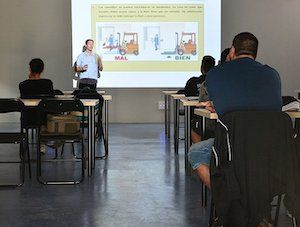How To Learn A Language On Your Own
Using books, software, apps and online courses, it’s possible to learn a new language by yourself, and even gain fluency. Depending on the type of learner you are, teaching yourself could also be the most effective way to learn.
As a site dedicated to learning in the cheapest way possible, we’ve found the DIY method to be the least expensive.
You might not have the opportunity to learn a language on a course, in a group, or in a foreign country where your target language is spoken.
For that reason, you’ll want to develop your self-study skills and come up with effective methods that suit your needs and your style of learning.
Is learning a foreign language on your own right for you?
What are some of the benefits?
Fit it around your schedule: Only you know how much free time you have to dedicate to this. Have a whole day to spare and want to immerse yourself in German? Or maybe you just have an hour a day.
Well, you have the freedom to choose what works best for you. Fit self-study into your daily or weekly schedule, learn as much or as little as time permits.
Go at your own pace: How quickly new concepts and vocabulary are absorbed is totally dependent on the individual.
If a particular area of language study is driving you nuts and requires more time spent to truly grasp, you can take as long as you need, then move on when you’re ready. Classroom-based, group courses don’t allow this.
Use methods that suit your specific learning strengths: We all learn differently, and some methods will be much more effective than others for you. Spending more time on those that are means you’re less likely to get bored, and you’re more likely to remember what you learn.
Cost: We can’t forget this! You can spend very little or nothing at all when you choose to teach yourself. There are an infinite number of free and cheap online resources that will help you achieve your language goals, and you can do them all from the comfort of your home.
No boring classroom-style instruction: We’ve all been that bored student sitting in French or whatever class, going over boring grammar points, and never learning a thing.
When you DIY your language learning, you can make the experience as fun as you like, and focus on the things that will get you speaking much quicker.

Where to start?
You need to decide what kind of learner you are, and what works best for you. It’s important to know how you usually learn things, because that will help you in choosing the right methods. Everyone will respond differently, so this isn’t a one-size fits all.
Love grammar and logic? Workbooks that teach grammar and vocabulary will be right up your alley. As a bit of a grammar and etymology nut, I’ve found the original Teach Yourself books are a great and dirt cheap resource, filled with helpful exercises that test you as you go.
Caveat: While you may build a sold foundation in terms of vocabulary, you’re unlikely to be able to use what you learn in practice and conversations. So further, less grammar-focused work will be needed.
More of an audio/visual type? You’ll get more out of watching movies/TV (the benefits of which I discuss here), playing video games, using gamification apps, and listening to music or the radio.
Caveat: You can hold off on the grammar at the start; however, in order to gain fluency you will eventually need to learn some grammar, otherwise you’ll make plenty of mistakes and not understand why.
Love to chat? Courses that are designed to get you speaking from day one, without spending any time on grammar at the start, will work well for you. I like to call this the Michel Thomas method (the courses are available in the free Audible trial on Amazon, if you’re interested.)
Very effective for those who need to speak and understand in a hurry. This is perhaps the most natural way of learning, and is less about building vocabulary than it is about experiencing the language.
Caveat: There’s only so long you should skip the grammar lessons. You’ll want to include that in your study plans eventually, to gain a better understanding of the nuts and bolts of the language.
Do you learn best by reading? Reading foreign language texts – books, articles, even TV scripts – is a great way to pick up lots of vocabulary. Translating books and penciling notes into it, using a dictionary, works really well in expanding vocabulary.

Caveat: As with courses that focus on grammar, if you ever plan to do anything more than read and write, you’ll want to throw some speaking and listening into the mix.
Now that you know what kind of learner you are, how do you start?
It’s important to build a solid foundation, which you can do with most free language apps and online resources, such as Duolingo.
This involves learning the basics: greetings and salutations, common verbs, everyday nouns, numbers etc. This is a crucial step in the process, and one you should not skip, as it can later create major gaps in your learning (believe me, I’ve been there).
1) Focus on the words and phrases you’ll use often. Learn the words for household items, people, food etc.
Not only will you feel a sense of achievement when you can count to 100 and know the names for common animals, this will make listening and reading much more pleasant, as you’ll be able to quickly identify words you know.
2) Build on that knowledge through one of the methods you’ve chosen that works best for your learning style. Whether it’s watching movies or reading books, you should start with simple stuff.
Cartoons, picture books, nursery rhymes, easy video games, apps or courses that get progressively difficult the more you learn… Whatever you choose should be entry-level, geared towards children or new learners.
When this stuff becomes tedious for you, it’s time to move on to bigger and better things. At this stage you should really delve into the language in its truest form:
- This is when I like to move to native content, not stuff that was translated into my target language from English.
- Seek out native conversation partners, whether in person or through apps like Tandem. There are plenty of people excited to do language exchanges with you, and you can usually find a language partner in most languages.
- Change the language of your Internet browser or phone to your target language, and force yourself to get used to seeing and using those words.
- Listen to music, and lots of it.
- When you’re comfortable enough, you should get a good dictionary solely in your target language – no translations. It will be daunting at first, but over time, and with frequent use, you will get used to it, and your vocabulary and understanding will go up tenfold.
3) Set aside a certain amount of time every day, dedicated to learning. If you say 1 hour a day, stick to that (though it doesn’t necessarily have to be the same time of day).

Language learning is about repetition, persistence and habit. Don’t set a length of time that makes the process daunting, otherwise you won’t want to do it.
Instead, work in manageable chunks of time. Learning half an hour every day is way better than 1 hour every other day.
4) Focus on all areas, don’t just stick to the ones you feel most comfortable with.
You will inevitably have a preference for one or more of the following: speaking, listening, reading, or writing. Work on them all, as building skills in one will help with the others.
5) Make notes. Write down new words and terms, then go over them at the end of each day.
Practise using your new language
Think in your target language, and talk to yourself, often!
If you don’t live in a country where your target language is spoken, and no one around you speaks it, this is the only way to develop your speaking skills.
Even if you do find a language partner online, they can’t be with you 24/7. Talking to yourself allows you to take your time, make mistakes without feeling nervous and embarrassed, correct yourself as many times as you like, and look up words you don’t know on the fly.
If you know the word or phrase for something in your target language, say it instead of using your native language.
Write about your day
Keep a diary/journal. Any words you don’t know, look them up. You should always have a dictionary — physical or digital, it doesn’t matter — to hand whenever you sit down to learn. You’re going to be referencing it a lot, so get used to that.

Immerse yourself in target language content
Play target language content in the background as much as possible, so that your brain gets used to the way it sounds. Over time what you’ll find is that you’ll begin to understand more and more.
Test yourself
Take one of the many free online tests to assess your knowledge and level, though this is more for vanity than anything else. What better way to stay inspired than to see how much you’ve progressed.
What are the downsides to learning on your own, and how can you overcome them?
As with everything, learning a language on your own does have its drawbacks.
1) No one to correct you when you make mistakes with grammar and pronunciation. Dropping bad language habits can be difficult, that’s why it’s advisable to seek out native speakers as soon as you can so they can correct you.
2) Nobody to keep you on track and stop you quitting when it seems like you’ll never gain fluency (because believe me, that’s coming).
Sometimes having a teacher does have its benefits, particularly if you’re someone who finds it hard to stay disciplined. Joining a language learning forum/community will help to keep you motivated.
Writing a blog or starting a YouTube channel to document your language journey will also keep you focused and make it less likely that you’ll abandon your dreams of speaking a second language.
3) Having no set schedule can make your learning erratic, and you might not improve on your weaknesses, or know how to improve. Following a set course should deal with this issue.
4) Having no one to speak to and have a genuine, natural conversation with could mean that you can’t put your knowledge into practice, thus keeping it theoretical as opposed to practical.
This is a common problem for those focusing more on reading and grammar. Again, seek out online speaking partners as soon as possible, even if you think you don’t know enough.

Final thoughts
It’s entirely possible to learn a second language on your own, combining many different methods so that you tackle and improve all skills.
But if you ever hope to gain fluency, you’ll need to talk to people! A big part of the process involves applying what you’ve learned, and you simply can’t do that if you don’t have conversations. After all, language did develop through our human need to communicate with each other.
So try not to stay too isolated on your journey. Go out and use your target language as soon as possible, and make some new friends!




